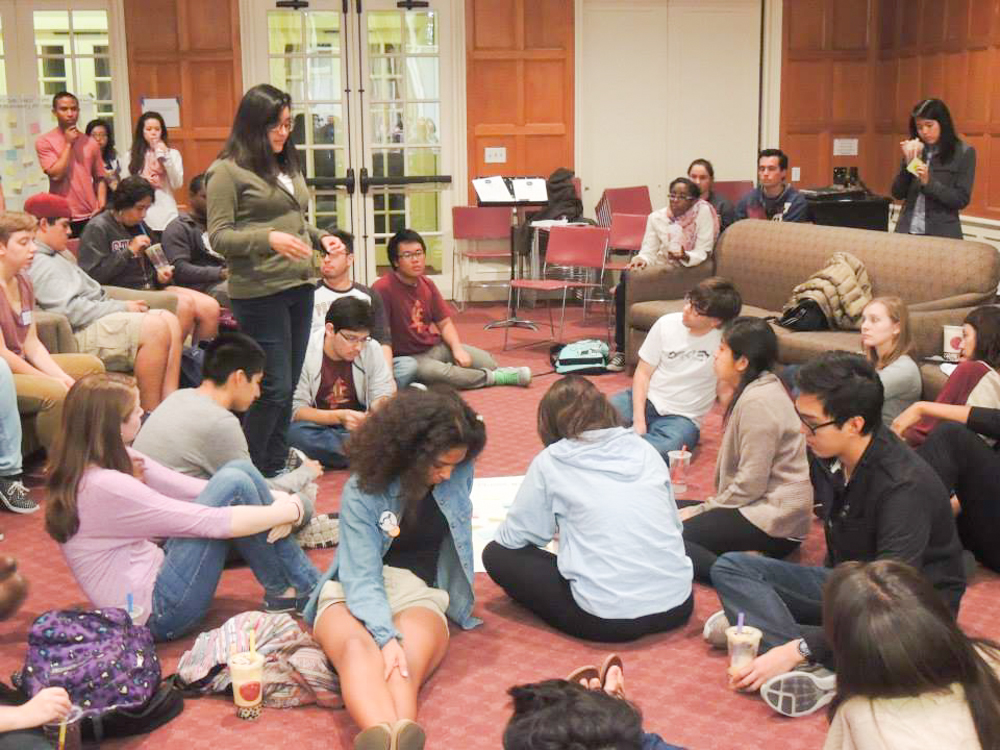On Tuesday night, The Stanford Review announced that a member of the First-Generation Low-Income Partnership (FLIP), who will be referred to as Jamie Keyes to protect the individual’s identity, had been suspended for writing an anonymous Review article earlier that day defending Stanford’s Structured Liberal Education (SLE) program’s focus on the Western Canon.
FLIP issued a statement late Tuesday night denying the allegation and a second follow-up to clarify that they had removed a member from a group chat for “concerns surrounding confidentiality.” The Review characterized FLIP’s responses as a misrepresentation, publishing two screenshots of FLIP group chats provided by Keyes.
Keyes also told The Daily that they were removed because their article went against FLIP’s official stance opposing a Western Civilization curriculum at Stanford.
Anonymous FLIP writer speaks out
“As an anonymous author, FLIP core kept trying to unmask me and kick me off for ideological reasons,” the Keyes told The Daily.
Keyes has gone to The Review, the Fountain Hopper and The Daily with screenshots in support of their claims. The information sent to The Daily was restricted to the fallout from the Review article and did not include any other FLIP members’ personal information.
The anonymous article was a follow-up to a controversial Review petition to introduce a compulsory Western Civilization core at Stanford, which FLIP had rebutted the day before.
Conflicting narratives
Within hours of The Review’s article on Tuesday, FLIP issued a statement on its Facebook page denying that it had suspended a student from its leadership team.
“We’re surprised and deeply hurt that there was a published accusation against FLIP without giving us time to comment or understand their accusations,” read the post on FLIP’s official Facebook page.
FLIP also denied any allegations that it had suspended a member on any grounds.
By Wednesday, The Review responded with screenshots of conversations on FLIP’s leadership team’s GroupMe chat. FLIP issued a second response that conceded that a member had been removed from the GroupMe due to “worries that there was a member providing specific confidential information from the group chat to The Stanford Review.” However, FLIP asserted that the member retained access to other FLIP channels and would be attending the group’s next core meeting.
According to FLIP, the information at risk included members’ “personal experiences, financial issues and other information they thought was shared in confidence.”
Keyes’ version of events is simple: As a member of The Review and FLIP, the individual had written an article in response to the negative reaction to the Western Civilization petition, focusing on their personal experiences in SLE. Keyes was aware from the beginning that their view might contradict FLIP’s public position and therefore wrote the Review article on the condition of anonymity. Keyes believes that FLIP suspected that they wrote the article and suspended them for not agreeing with FLIP’s official stance.
“I got a screenshot [from a fellow FLIP member] saying I got kicked off for mainly ideological reasons,” Keyes said. “I emailed [the FLIP leadership team] using the mailing list and got promised a phone call.”
The screenshot in question showed a FLIP leader questioning Keyes about the author of the article right before their removal from the group chat.
When asked for a response, Delia Addo-Yobbo ’16, co-president of FLIP, repeated the group’s official statement on its Facebook page word-for-word via email.
Keyes stated that the first screenshots were taken by other FLIP members to explain their removal from the GroupMe and that they had taken screenshots afterwards in self-defense.
Authorship, anonymity and FLIP’s privacy
Keyes claimed that they had tried to minimize the potential clash between their role as a Review writer and a FLIP member by publishing anonymously.
“I gave FLIP the courtesy of being anonymous in case of a conflict of interest,” Keyes said.
Keyes spoke with the FLIP leadership on Tuesday evening in an attempt to clarify their status in the group. Both Keyes and FLIP leadership sidestepped the issue of who wrote the Review article, with the FLIP leader unable to demand a confession given the author’s anonymity, and Keyes refusing to confess. Instead, Keyes spoke of “the author of the Review article” in the third person.
Nonetheless, FLIP was certain enough of the anonymous author’s identity to remove Keyes from the group chat.
“I’ve always felt I couldn’t tell FLIP that I was writing for The Review, because I would be negatively judged,” Keyes said. “I’ve definitely noticed an anti-Review bias in FLIP.”
On FLIP’s reasons for the removal, Keyes said that “it’s very clear they consider me a ‘breach of privacy’ as a Review staff writer,” referring to FLIP’s official reasoning for removing the member from the GroupMe.
Keyes briefly considered going to the administration on grounds of privacy and discrimination against their beliefs but ultimately decided not to. Meanwhile, they said they want to be allowed to remain in FLIP — a decision that will likely be made at FLIP’s regular board meeting this Sunday, according to Keyes.
“I want FLIP to not do this to any other student,” Keyes said. “It’s both for my sake and for other first-generation, low-income students, because I think it’s important for every student to feel safe, and I want to assert my right to be in that space.”
Contact Fangzhou Liu at fzliu96 ‘at’ stanford.edu.
